Stateless version
The Account-Based paradigm, in its stateless form, allows executing smart contract functions without maintaining any internal state.
You can also play the game on the Solana testnet on the address Enq7EUNZshTBsTMDzimmv4dv1wC8jaZmm7wgrSH4UPsj using the provided client code
The provided code snippets are pseudocode representations. You can find the actual implementation with:

In the initial steps, we must set up the essential data structures required to establish the initial state of a Tic Tac Toe game on the Solana blockchain. The GameData structure is responsible for storing game-specific details, while the InitializeCtx structure serves as the context for initiating the game. The initialize function acts as the starting point for configuring the game state by utilizing the provided context and parameters.
// Enum representing the game board cell
pub enum Symbol {
SymbolX,
SymbolO,
SymbolEmpty,
}
// Struct representing the game state
pub struct GameData {
pub player_a: Pubkey,
pub player_b: Pubkey,
pub turn_a: bool,
pub player_a_has_deposited: bool,
pub player_b_has_deposited: bool,
pub board: [[Symbol; 3]; 3], // 3x3 board
pub end_slot: u64,
pub required_amount: u64,
}
// Context of accounts passed to the initialize function
pub struct InitializeCtx {
pub initializer: Signer,
pub game_data: GameData, // initialized by the 'initializer'
pub player_a: SystemAccount,
pub player_b: SystemAccount,
}
// End point to initialize the game
pub fn initialize(ctx: InitializeCtx, required_amount: u64, delay_slots: u64) {
let game_data = ctx.accounts.game_data;
game_data.player_a = ctx.accounts.player_a
game_data.player_b = ctx.accounts.player_b
game_data.turn_a = true;
game_data.player_a_has_deposited = false;
game_data.player_b_has_deposited = false;
game_data.board = [[Symbol::SymbolEmpty; 3]; 3];
game_data.end_slot = Clock::current_slot + delay_slots;
game_data.required_amount = required_amount;
}
The make_move function is responsible for updating the game state by allowing players to make a move. The function requires the player to be the current player, the cell to be empty, and the game to not have timed out. If these conditions are met, the function updates the board, checks if the player has won, and switches the current player.
❗ It's also important to note that it is crucial to check if the game_data account is owned by the program and also if the provided player has signed the transaction. Othervise, anyone could call the make_move function and modify the game state acting like the provided player. The Anchor framework makes this check automatically by typifying player as Signer.
// Context of accounts passed to the make_move function
pub struct MakeMoveCtx {
pub player: Signer,
pub game_data: GameData
pub system_program: Program<'info, System>,
}
// End point to make a move
pub fn make_move(ctx: MakeMoveCtx, row: u8, col: u8) {
let game_data = ctx.accounts.game_data;
let player = ctx.accounts.player;
let (current_player, deposited) = if game_data.turn_a {
(game_data.player_a, game_data.player_a_has_deposited)
} else {
(game_data.player_b, game_data.player_b_has_deposited)
};
if !deposited {
// make 'player' deposit 'game_data.required_amount' to 'game_data' account
if game_data.turn_a {
game_data.player_a_has_deposited = true;
} else {
game_data.player_b_has_deposited = true;
}
}
require!(player.key == current_player, Err::InvalidPlayer);
require!(Clock::current_slot < game_data.end_slot, Err::TimeoutReached);
require!(row < 3 && col < 3, Err::InvalidPosition);
require!(game_data.board[row][col] == Symbol::SymbolEmpty,Err::CellOccupied);
let player_symbol = if game_data.turn_a { Symbol::SymbolX } else { Symbol::SymbolO};
game_data.board[row][col] = player_symbol;
game_data.turn_a = !game_data.turn_a;
if check_winner(game_data.board) {
let amount = game_data.required_amount * 2;
// Transfer 'amount' from 'game_data' account to 'player' account
}
}
fn check_winner(board: [[Symbol; 3]; 3]) -> bool {
// You can find the implementation of this function in the full code
}
Finally, we need a function to allow players to withdraw their funds if the game times out. This function requires the game to have timed out and the player to not be the current player. If these conditions are met, the function transfers the funds to the player.
// Context of accounts passed to the timeout function
pub struct TimeoutCtx {
pub player: Signer,
pub game_data: GameData
pub system_program: Program<'info, System>,
}
// End point to withdraw funds after timeout
pub fn timeout(ctx: TimeoutCtx) {
let game_data = ctx.accounts.game_data;
let player = ctx.accounts.player;
let allowed_player = if game_data.turn_a { game_data.player_b } else { game_data.player_a };
require!(Clock::current_slot >= game_data.end_slot, Err::TimeoutNotReached);
// Make 'player' withdraw 'game_data.required_amount * 2' from 'game_data' account
}